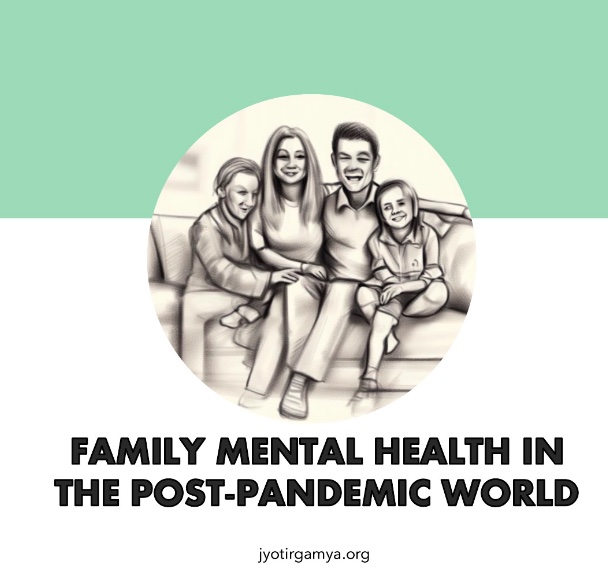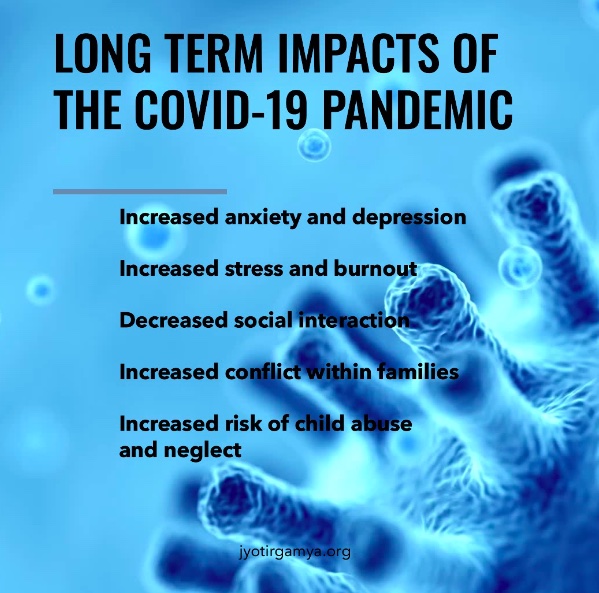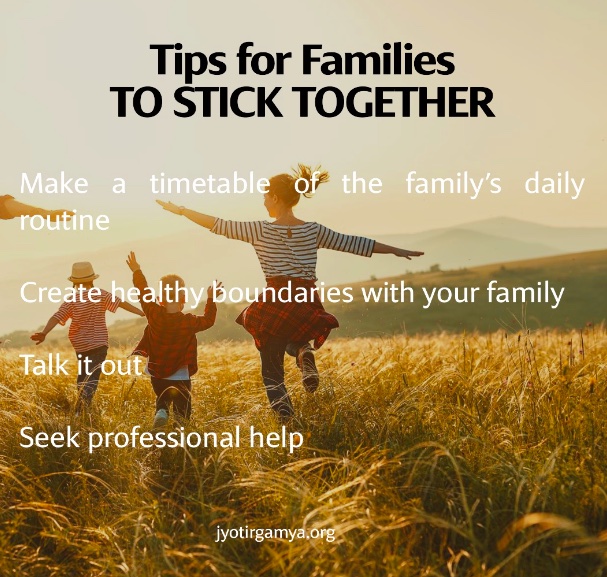Family Mental Health in the Post-Pandemic World
The Coronavirus pandemic, and its associated self-isolation, have brought many concerns to families and children. Due to the lockdown and self-isolation, all family members are now huddled together under one roof. For some families, all members have stayed together, whereas, for others, children/parents have moved into one home. This has increased face time and a need for physical and mental space.

Daily routines, constriction of space, having time off from each other – all have been disrupted. But on the other hand, families whose members stay in different cities/countries feel helpless because they cannot provide the required support. This is also a significant cause of increased worry and anxiety about the safety of those family members.
The pandemic has also disproportionately impacted certain groups of families, such as single-parent families and families with children with special needs. In addition, these families may have faced additional challenges during the pandemic, such as financial hardship and lack of access to resources.
Individuals and families, with their routine issues, are now battling new concerns such as financial loss, pay cuts, job/business uncertainty, monthly investments, financial loans, rents, and dietary restrictions. It feels even more helpless because there doesn’t seem to be an understanding of when things might bounce back.
Cause for Pause: The earth is healing! Environmental changes are visible with the pollution levels dropping, the sky is more transparent, and birds and animals are rejoicing! Humans have finally stopped running and are stopping to talk, unwind, and build self-awareness and deeper bonds with others.
The pandemic may have a lasting impact on family mental health, even after the pandemic is over. Therefore, families need to be aware of the potential long-term impacts of the pandemic on their mental health.
Some of the long-term impacts of the pandemic on family mental health could include:
- Increased anxiety and depression
- Increased stress and burnout
- Decreased social interaction
- Increased conflict within families
- Increased risk of child abuse and neglect

This is the time to focus on physical, mental, and emotional health. To improve physical health - Eat well and follow breathing and physical exercise. To improve mental and emotional health - express, share, and understand each other rather than questioning, dismissing, and alienating family members.
1. Tips at an Individual Level
In these turbulent times of the Covid-19 pandemic, it is natural to feel anxious, stressed, fearful, and confused. The print and online media present a grim picture. I encourage families to follow these tips to face the pandemic at an individual level.
2. Tips for Couples/Partners/ Single Parents in the House
Our physical health is linked to our mental health, contributing equally to our well-being. In turn, our children’s well-being is linked to our well-being. So, first and foremost – take care of yourself. Spend time with, talk to your confidant about your feelings, and use this time to build on self-awareness and strengthen your relationships. Share responsibilities – household chores, child care, and emotional load. Take turns so that everyone can get enough rest.
3. Tips for Children in the House
Educate your children on the safety precautions necessary to keep them safe. So, limit watching Coronavirus-related news and discussing Coronavirus-related statistics in front of your children. Instead, divide house duties and involve your children in household chores.
4. Tips for the Elderly in the House
Older adults generally have lower levels of tolerance towards change or bad news. Normalizing the impact of the Covid-19 pandemic is imperative. Try to keep their daily routine as close to their standard as possible.
5. Tips for the Family as a Whole
Each family is affected by the prevalence and spread of the Covid-19 pandemic. No one is sure what the future holds, whether it is in lockdown or a lifestyle change. Allow all emotions in the house. Encourage each other, older adults, and the children to express and share their feelings. Some days one may feel frustrated, upset, depressed, helpless, fearful, anxious, or scared – instead of dismissing them, try acknowledging each other’s emotions. Encourage family members in the house to talk about different topics other than Coronavirus and the doom of self-isolation.

Make a timetable of the family’s daily routine
Make a plan filled with indoor activities, such as breathing and physical exercises, reading, watching TV, playing board games, and catching up with family and friends through video/ audio calls. Ensure that if any of YOU parents are working from home, mark that time as – work from home, where you go into a separate space and are not to be disturbed by family members.
Create boundaries with your family
It is healthy to give each other space; it boosts individuality, independence, respect, and confidence for each family member, thereby strengthening the core of the family. While there is family time (at meals, during chores, or in fun activities), you also spend some time apart. Creating and respecting boundaries ensure you avoid situations of conflict.
This time can increase family conflict or be a beautiful opportunity to build meaningful bonds with your children. You have been given the gift of time; use it judiciously. Spend time with older people and your children. Let everyone remember this as the best time of their lives, where they get to spend time, develop deeper bonds, relax, and make memories for life. Take care and stay safe!
Talk it out
Talk about your feelings and experiences. It is essential to express your emotions, both positive and negative. Talking about your experiences can help you process and healthily cope with them.
Seek professional help
Seek professional help if you are struggling. If you are experiencing anxiety, depression, or other mental health problems, it is essential to seek professional help. A therapist or counselor can help you to understand your problems and develop coping mechanisms.
About the Author

Dr. Lubhana Malik is an Experienced Psychologist who has been working in the marital and family problems and mental health field for over a decade.
She holds a Doctor of Philosophy (Ph.D.) in Intimate Relationships from Delhi University.
She seeks to proactively improve, build and strengthen personal relationships with one & one’s family in a safe environment and, in the process, help to de-stigmatize relationship counseling.
That’s all in this edition.
If you liked reading the article, do share it with folks who would benefit from it.
Want to stay connected? Here’s our twitter.
Related Articles
Five Easy Ways to Manage Jealousy
Secrets to a Lasting Relationship
How to Avoid Relationship Problems in 2023